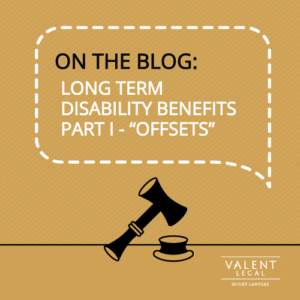What is an “Offset” in a Long Term Disability Case?

Whether you are receiving monthly payments from your Long Term Disability (LTD) Insurer, or engaged in a lawsuit trying to obtain benefits, the issue of “offsets” will inevitably become an issue.
The Most Common Offsets
Almost all LTD policies allow the insurer to deduct (or offset) other benefits from their insurer payout amount. The most common offsets are CPP Disability benefits (“CPP-D”) and workers’ compensation benefits (WCB). Other types of offsets relate to employment income, severance pay, or weekly indemnity benefits arising from a motor vehicle accident.
Most claimants do not realize they cannot stack various types of benefits. Additionally, there is often great confusion about the order of who gets to offset first. Generally, insurers pay WCB benefits first; LTD benefits second. CPP-D benefits are almost always taken as a deduct from monthly payments under a group or individual LTD policy.
What is a “Zero Sum Offset”?
Claiments receiving LTD benefits while receiving the same or more money from other sources, may have their LTD benefits offset to zero. For example: Client A has a monthly LTD benefit totaling $2,500. But Client A also has a monthly WCB payment totaling $1,800, as well as CPP-D disability benefits totaling $800.00. So Client A is receiving $2,600 from WCB and CPP-D payments, which is more than the total LTD payment ($2,500). This results in a zero offset.
Being in a zero offset position can cause many to walk away from a potential claim against an LTD Insurer. This can be a costly mistake if you lose your other sources of income. If the limitation period to claim against your LTD insurer has expired (normally 1 year from the date of denial), this can put you at risk. Approval from a zero offset position, however, is often much easier to achieve as the LTD insurer has minimum risk that they will ever have to pay the claimant.
Most LTD policies allow for the deduction of the original CPP-D award, and not the indexed amount after it increases each year to account for inflation. There have been several instances where LTD insurers have attempted to use the indexed amount when negotiating a lump sum settlement/surrender of the Policy.
Depending on the LTD policy, the insurer may deduct CPP Children’s Benefits. Country-wide challenges to this policy have been unsuccessful. Which is infuriating to many. However, there is an interesting issue that has evolved that may affect the Insurer’s right to do so. We have seen cases where Service Canada requires the LTD insurer to promise that they will not claw back the CPP Children’s benefit. Agreement by the LTD insurer to do so may mean they cannot change their mind in the future.
At Valent Legal, we have had success advancing this argument, and have been able to save our clients several thousand dollars as a result.






















